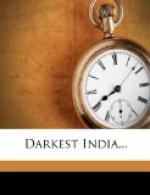A short time ago I was visiting a Mahommedan gentleman in the Native quarter of Bombay. It was in the morning before he went to business, and I happened to hit upon the very time when the beggars made their usual rounds. I should think upwards of fifty men and women must have called during the few minutes that I was there. In fact it seemed like one never-ending string of them reaching down both sides of the street. Some sang, or shouted, to attract notice; others stood mutely with appealing eyes, wherever they thought there was a chance of getting anything. Many received a dole, while others were told to call again. I could not but be struck by the courteous manner of my host to them, even when asking them to pass along.
On the opposite side of the road some food, or money, I forget which, was being distributed to a hungry crowd by another hospitable merchant. Evidently the supply was limited, and it was a case of first come first served. The desperate struggle that was going on amongst that little crowd of some fifty or sixty people was pitiful to behold.
Now the present system, while better than nothing, is fraught with many serious objections, with which I am sure my Indian readers will agree.
1. The weakest must inevitably
go to the wall. It is the strong
able-bodied
lusty beggar who is bound to get the best of it in
struggles
such as I have above described, although he is just
the
one who
could and ought to work and who least needs the charity.
He
is able
also to cover more ground than the weak and sickly.
To the
latter the
struggle for existence is necessarily very severe,
and
while needing
and deserving help the most they get the least.
2. This unsystematic
haphazard mode of helping the poor is bound to
be attended
with serious inequalities; while some get more than
is
either good,
or necessary, others get too little, and for the
majority
even supposing that on two or three days of the week
they
succeeded
in getting a sufficiency, the chances are that on four
or
five they
would not get nearly enough. It would be interesting
to
know the
total amount of food thus distributed and the number
of
mouths that
claim a share.
3. Of course in the case
of any rise in the price of grains, the
position
of the beggar is specially painful, as it is upon him
that
the weight
of the scarcity first falls.
4. Again the present
system is a distinct encouragement to fraud. It
is impossible
for the givers of charity to know anything about the
characters
of those to whom they give. Thus much of their
generosity
is misapplied,
and the most pitiable cases escape notice, either
because
they have not so plausible a tale, or because they
have not
the requisite
“cheek” for pushing their claims.




